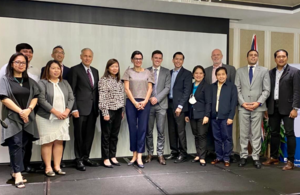DOE, UK hosted second Energy Transition Council National Dialogue
The Department of Energy and the British Embassy Manila hosted the second Energy Transition Council (ETC) National Dialogue on Tuesday, 22 November 2022.

The Department of Energy (DOE) and the British Embassy Manila, in collaboration with the Asian Development Bank, South East Asia Energy Transition Partnership and the United States Agency for International Development, hosted the second Energy Transition Council (ETC) National Dialogue on Tuesday, 22 November 2022.
The Philippines is one of the participating countries of the ETC, an initiative launched in 2020 as part of the UK COP26 Presidency. The ETC provides a platform for solutions-based discussions and coordination between countries that require support for their energy transition and major international donors and institutions that offer assistance. Since the first National Dialogue in March 2021, donor support for six priority TA projects relating to ancillary services, energy labelling, ocean and thermal energy, smart grid and energy storage system, and offshore wind have been mobilised through the Rapid Response Facility, ETC’s technical assistance coordination mechanism.
The 2022 National Dialogue focused on the country’s policy direction and priority investments in clean energy and emerging technologies, such as offshore wind, hydrogen, and energy storage systems, which are aligned with the administration’s push for increased use of indigenous and renewable energy sources. With thecountry’s abundant natural resources, there is vast potential to harness renewable energy. According to Undersecretary Felix William Fuentebella, “[The ETC] it is very important because it is the forum of all forums – it is the one that basically coordinates all of us, all the partnerships towards one goal in making sure that we comply with our obligations under UNFCCC.’’
Renewable energy solutions have become more widely available, cost-competitive and technologically proven, making them good business opportunities. Following the issuance of the Department of Justice’s opinion easing the 60:40 foreign equity limitation on renewable energy sources, DOE shared that they have amended the implementing rules and regulations of the Renewable Energy Act of 2008 to allow 100% foreign capital in RE projects, which is expected to attract foreign investments into the sector.
Senior government officials, representatives from the diplomatic community and donor institutions, CSOs and other key energy stakeholders attended the dialogue in support of the country’s power transition goals. In her opening remarks, British Ambassador Laure Beaufils said, ‘Today’s Energy Transition Council is all about bringing international community and private sector together to support the Philippines’s Renewable Energy transition. The ETC’s Rapid Response Facility (RRF) matches commercial, regulatory and policy assistance requirements arising from the ETC dialogues to be matched with existing programmes or additional technical assistance.”
The ETC also welcomed next year’s roster of ETC co-leads, namely the Royal Danish Embassy, GIZ (German Development Agency), and the World Bank to work closely with the DOE and ETC in identifying, coordinating and implementing targeted measures in specific energy sector areas, namely energy efficiency, clean energy and reliable energy systems respectively, to help accelerate the energy transition in the country. As co-lead of the energy efficiency working group, Danish Ambassador Franz-Michael Mellbin underscored that the Philippines has every opportunity to decouple future growth from energy consumption and highlighted energy efficiency as the first fuel to achieve energy security.
For more information, please contact:
Josephine Orense
British Embassy Manila
[email protected]